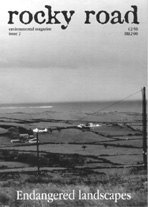|
from 3 march 2002 blue vol II, 23 |
|
|||

by Anne Ruimy [1]
Without the time or the will to promote or explain the issues to the people [3], merely months away from a general election, the government risks another fiasco similar to the rejection of the Nice Referendum in June 2001. The haste may indicate that it has a hidden agenda: get the Celtic Tiger roaring again![4]
"The investment community is always looking for the next big thing," said Richard Garr, president of NeuralStem BioPharmaceuticals Ltd. "And stem cells are definitely a candidate to be the next big thing." [5]. Ireland is doing just this: positioning itself to be able to attract investment in new biotech research - not least because stem cell research is among the proposed research priorities under the 6th European Union Framework Research Programme 2002 to 2006. Minister for Enterprise, Trade and Employment Mary Harney, commenting on a new public private partnership between Enterprise Ireland and Irish firm Seroba BioVentures, said: "Biotechnology is predicted to be a major basis for economic growth this century." [6]
But there is one hurdle along the way. Human stem cell research conflicts with most countries' bio-ethics legislation that define human life as starting from conception. In France, eleven personalities including philosophers, sociologists and geneticists stated in an open letter that the competition between laboratories is driving countries to legalise the experimentation and industrial exploitation of human embryos as fast as possible.[7]
The wording is vague, the issues relatively non-controversial. Some would say that changing the Irish Constitution was long overdue. There is however one item that stands out by its precision and apparent incongruity. A section of the bill spells: "In this Act, 'abortion' means the intentional destruction by any means of unborn human life after implantation in the womb of a woman," while a subsection premises: "'Woman' means a female person".
As was the case during previous abortion referenda, Irish public opinion is divided. Interestingly, the split does not divide religious against women rights groups clearly or in expected ways. The Well Woman Centre urges a No vote [8]. Peter Byrne, Director of the Family Prayer Movement, Redemptory Monastery, Limerick recommends a Yes vote [9]. As for Father Tom Ingoldsby of the Salesian House in Ballinakill, Portlaoise, he is rather confused. "I recently sent a letter in which I argued for a Yes vote in the Abortion Referendum. On further examination and consultation, I find that in conscience, I cannot vote Yes" [10]. [also confused, is Dana - Tim]
Leaflets produced by the Catholic Pro-Life Alliance distributed to rural post-offices detail the motivations behind their own No recommendations. They include the following, little-publicised argument: "The government claims that this section is to legalise abortifacient drugs. However we know that the real reason is to allow experimentation on babies in science laboratories, like rats." Beyond the polemical language, there might just be some truth to this argument.
With the potential to derive stem cells from adult as well as embryonic tissues, research will not necessarily lead to the destruction of unwanted embryos. It will not necessarily lead to cloned human beings, as "therapeutic" (unlike "reproductive") cloning generates human tissues that would not be viable - outside the womb of a woman. In fact it may even eventually save lives of unborn babies, as research might lead to increasing the proportion of embryos that will develop until birth - inside the womb of a woman. But behind the diversity and complexity of techniques, there is a danger that the human race will lose its humanity.
Environmentalists have denounced and sometimes physically resisted the advance of genetically modified foods, sometimes nicknamed "frankenfoods". Partly as a consequence, the biotech industry is backing out of this research domain. Partially only. Similarly to the information technologies world, where the buzzword "broadband" has replaced "dotcoms," the next boom in biotech can only come if a totally new technology comes along, with far superior potentialities. This new technology is human stem cell research. And the Celtic Tiger wants its share of it.
Jeremy Rifkin, President of the Foundation on Economic Trends in Washington DC, summarises the evolution in human reproduction thus: "The pill revolutionised sex, removing it from the process of reproduction, artificial insemination, then later in vitro fertilisation, egg donation, surrogacy and, soon, cloning further separate the components of reproduction from the biological act of mating. The artificial womb completes the process." [11]
After the upcoming Abortion Referendum, or should we call it Human Stem Cell Research Referendum, the next Irish referendum will perhaps not need to mention women's wombs at all.
- Anne Ruimy
|
||


 The bill put to Irish voters in the upcoming referendum proposes to recognise a woman's rights to freely travel to another country for an abortion, to obtain an abortion in her own country in the case of danger to her life, and to obtain information about abortion.
The bill put to Irish voters in the upcoming referendum proposes to recognise a woman's rights to freely travel to another country for an abortion, to obtain an abortion in her own country in the case of danger to her life, and to obtain information about abortion.
 Environmentalists who opposed the modification of plants and animals ending up on our plates should realise the next modification is the very essence of our humanity. The future ahead is human reproduction in test tubes, probably combined with genetic modification of human beings. As in other developed countries, the debate about unborn human life in Ireland should not be confined to the protection of embryos in their mother's wombs. The debate should include the protection of humanity as we know it.
Environmentalists who opposed the modification of plants and animals ending up on our plates should realise the next modification is the very essence of our humanity. The future ahead is human reproduction in test tubes, probably combined with genetic modification of human beings. As in other developed countries, the debate about unborn human life in Ireland should not be confined to the protection of embryos in their mother's wombs. The debate should include the protection of humanity as we know it.

